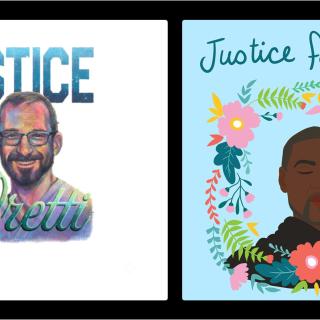Naomi Klein’s No Logo exposed the insidious invasion of our psyches by the billions of dollars in carefully scripted ad messages – propaganda - designed to program our brains to accept the branding of products and services churned out by the multinational corporations that run the global consumer economy. More recently, in the era of social media, Shoshanna Zuboff’s The Age of Surveillance Capitalism demonstrated how the ad industries now steal our privacy by scraping the details of our lifestyles from the apps on our cell phones to feed Big Data’s targeted marketing campaigns in their endless pursuit of profit. Adbusters subtitled “The Journal of the Mental Environment” is a go-to resource to counteract and awaken resistance to the consumer culture.
Green Consumers. Many commentators understand that our consumer driven lifestyles must change, and to a degree “green” or eco-friendly products and services are emerging within the consumer economy. Organic produce, fair trade certifications applied to supply chains, incentives to purchase solar energy and drive electric cars – all good. But these individual consumer choices are not happening fast enough to drive the kind of transformational changes needed if we are to address the climate crisis in this decade.
Lifestyle choices are important and collectively can make a difference. Clearly, we need policies to scale up common sense practices to use less energy, support local food systems, buy less stuff, etc. But we must ask why proposals to legislate structural changes in the current system have been blocked, ignored, and often attacked.
Private Sector Rules… It’s frustrating but government actions like the Green New Deal proposal to avert current and looming climate disasters are thwarted by an economic elite that has severely harmed our American political institutions. The Reagan revolution 40 years ago promoted the Ayn Rand belief that the private sector was the real driver of progress and will lead to prosperity for all, but only if the government minimizes regulations to allow business to operate in a “free market.”
Further, our judicial system has given corporations the rights of individual people, along with the right to influence policies by corrupting our political leaders with whatever amount of cash is needed to ensure their election. Move to Amend, designed to deny individual rights to corporations and decouple money from the right to free speech, languishes despite overwhelming citizen support.
Our political system is in fact rigged . This is why reforms to tax carbon pollution, subsidize clean energy, end monoculture farming, ban fracking, create public banks, invest in public infrastructure, deliver health care for all, and guarantee quality housing and livable wage jobs have been unsuccessful. These and a host of other policy reforms have been stalled or stopped because they limit the profits of what is now, according to Jimmy Carter, effectively a corporate oligarchy that runs roughshod over our democratic institutions. Independent research has documented that the preferences of ordinary citizens have no statistically significant impact on government policies and priorities, in stark contrast to the influence of the economic elite.
So if we conclude that lifestyle changes are not enough, we must acknowledge that policy reforms are also failing to make systemic changes in a timeframe that will seriously address climate change in the next decade. As we sink deeper into the sixth great extinction and despair of being unable to change the course of transnational corporate capitalism subsidized by cheap fossil fuels – and wars waged to keep the sea lanes open for oil tankers and commodity trading – is there any hope left?
The answer is an urgent yes, but it requires that we reframe the dilemma we face and focus on the underlying cultural DNA that is driving human civilizations to the brink of ecocide.
Culture Shift. Let’s return to lifestyle changes. The real value of these common sense social and environmental practices - and their bottom up movements that offer alternatives to the corporate, business-as-usual status quo - is their cultural significance. Collectively, environmental and social justice movements are creating the foundations for new, inclusive, fair and just ecological cultures that are locally rooted in diverse communities everywhere. It’s emerging around the world and promises to supplant the monolithic global consumer culture.
Collapse. Hope is embedded, ironically, in the collapse of the consumer culture and the global economy that drives it. What most people fear – the disruption of our convenient, middle class lives – is a necessary condition if we are to transition to ecologically-based cultures.
Thanks to the global pandemic, the Great Disruption to our consumer culture is happening now. As I write this, all 50 states have ordered some level of sheltering in place and physical distancing; policies that effectively destroy the economy on Main Street as well as the global economy. The potential upsides to this otherwise horrific viral pandemic are suddenly made visible by their absence.
> Health care for all looks like a no-brainer.
> We love and miss our locally owned businesses and neighborhood restaurants.
> Digital screen chats, cool, but we miss each other in the flesh
> Made in USA looks great again.
> Outsourcing our manufacturing now seems crazy!
> Andrew Yang’s Freedom Dividend? Bring it on.
> We can change our behavior in a crisis (think climate crisis)
> We can find money to bail out people and small businesses, not just banks
Precisely because of the devastating impacts of the pandemic, the flaws of the global consumer culture are exposed and raw. Suddenly, the progressive agenda, captured broadly in a comprehensive Green New Deal (GND) looks like the solution to the crisis – Health Care for All, a Job Guarantee or Guaranteed Income, rapid transition to renewable energy, Housing Guarantee, Public Banking, and legislation from Congress (similar to the CARES legislation) authorizing the Federal Reserve to fund the implementation of these structural changes.
The Chinese character for Crisis also means Opportunity.
As Naomi Klein explained in her book, The Shock Doctrine, times of crisis and social disruption are fertile ground for ideas that were once on the fringes to be reconsidered if they promise to solve the crisis. Klein states:
“During moments of cataclysmic change, the previously unthinkable suddenly becomes reality. In recent decades, that change has mainly been for the worst — but this has not always been the case. And it need not continue to be in the future.”
The COVID-19 crisis has created a radical disruption of our health care and economic systems. Now progressive champions of all just causes must seize this unique opportunity to unite and bring about a transformational culture shift that will reclaim democracy from the corporate oligarchy and begin the work of restoring the earth’s regenerative ecosystems.
Local Solutions. The challenge now is to localize the current, unsustainable global consumer economy. We must restore and expand our local food systems, ensure health care for all, support locally owned businesses, install micro grid-based community solar and wind power systems, establish the rights of nature, strengthen home rule in our communities, promote participatory democracy, design eco-villages in suburbs and urban neighborhoods, and create public funding and currency systems that invest in affordable housing, guarantee living wage jobs, and provide free public education at all levels.
The GND can be a lynchpin to leverage the leap to an ecological economy rooted in new cultural values.
Great Turning.Thanks to growing awareness of the existential threat of climate catastrophe, it’s now commonplace to accept that humanity has arrived at a critical inflection point: we must change course or face extinction. The economist David Korten called it the Great Turning away from empires to earth centered communities.
Humans have enjoyed the climate of the Cenozoic Age of flowering trees for millennia but our technologies have created global warming such that scientists now say we are entering the Anthropocene, a word that reflects the impact of our species on all life on earth.
Cultural historian Thomas Berry’s The Great Work: Our Way into the Future frames this transition from the Cenozoic era as the choice between creating a new Ecozoic Era rather than a Technozoic Era that continues our exploitation of the earth’s resources for our human use. Philosophically, Berry contrasts these two paths:
“The universe is a communion of subjects, not a collection of objects.”
This is a profound aphorism as it puts into sharp relief the deep division between the worldview of the new sciences and the mechanistic sciences that have dominated the Western worldview for centuries. The new sciences - quantum physics and astrophysics, chaos theory and self-organizing systems, cell biology, epigenetics, and symbiotic evolution – reveal a deeply interrelated world within nested ecological communications and complex information flows. We now live in a world of ecologies – human experiences embedded in relationships with the earth, plants, and animals, but also media ecologies, social, urban and rural ecologies – all systems are now seen as ecosystems. As Native Americans put it: “All Our Relations.”
Consumer Science. The old scientific, materialistic worldview derived from Newton and Descartes, and the amazing Greeks long before them, assumed that we human animals are separate from the observable world of our senses. Setting aside philosophy and the nature of mind-matter-consciousness – the consumer culture is the poster child for seeing the world as a “collection of objects“ – from extraction to production to distribution to disposal. Add money to invest and market the objects, we get Economics. Sociology shows that Status accrues to those with the most objects, and Political Science correlates those with monetary wealth and status are those who exercise Power.
The consumer culture with its values of individualism and materialism, and measures of success linked to wealth, status, and power, still holds sway over all of us mostly white, privileged folks hooked on the convenience of satisfying our every whim in the affluent bubble of capitalist societies. That bubble is being burst by the Achilles Heel of a worldview based on the fiction or illusion that we human animals are separate from what we considered the “external” world. Time’s up. The steady destruction of the earth’s ecosystems, on steroids with cheap fossil fuel energy, has resulted in the climate crisis, and now the economy-killing COVID-19 viral pandemic.
As Bob Dylan sang poetically in The Times They Are A-Changin’ –
“Your old road is rapidly agin’
Please get out of the new one
if you can’t lend your hand.”
Another world is possible. Localization can now be seen as the grassroots impetus emerging to create new, socially just, ecologically based cultures that are challenging the global consumer culture. Helena Norberg-Hodge, author of Local Is Our Future and producer of the award winning documentary, Economics of Happiness, paints a positive vision of the future.
The good news is that the path to such a future is already being forged. Away from the screens of the mainstream media, the crude ‘bigger is better’ narrative that has dominated economic thinking for centuries is being challenged by a much gentler, more ‘feminine’, inclusive perspective that places human and ecological well-being front and center. People are coming to recognize that connection, both to others and to Nature herself, is the wellspring of human happiness...-Helena Norberg-Hodge
Norberg-Hodge coined the term Big Picture Activism to capture and reframe the narrative for change agents and the multiplicity of social and environmental justice movements. Challenging the negative impacts of neoliberal economic globalization is essential, but even more important is an inspiring message of a better, healthier, higher quality of life after the work of transitioning to a new economy and a life centered culture.
Rev. Dr. William Barber, leader of the new Poor People’s Campaign, embraces the broad range of social and environmental justice movements and unites them all under a moral mission to build upon the legacy of Rev. Dr. Martin Luther King, Jr. Barber calls for a new fusion politics that asks leaders of change initiatives to support one another. Demonstrations and non-violent civil disobedience will require all of us to stand together in challenging the rigged systems of the corporate status quo.
Tipping Point. The first Earth Day in 1970 attracted 20 million people, which was about 10% of the U.S. population at the time. Social change research shows that change movements must reach somewhere between 10 and 12% of the population before a tipping point is reached. When that occurs the opportunity for significant or transformational change becomes possible. The rest of the population then accepts and adapts to the new cultural shift as reflected in legislation and new social norms. What was once on the fringes follows Gandhi’s dictum:” First they ignore you, then they laugh at you, then they fight you, then you win.”
Polls show widespread public support for the Green New Deal and most of the progressive agenda. That’s good, but as we have seen, that support has not translated into action. Today, we likely have 2-3% of the population actively committed to 350.org, the Poor People’s Campaign, Black Lives Matter, Single Payer Action Network, Move To Amend, Organic and Vegan Food Movements, and others. There is increasing collaboration but more dots will need to be connected until we reach 10-12% of the population (~33 million) who are willing to join together in cities across the country to reclaim our democracy and implement transformational change like the Green New Deal.
As Arundhati Roy famously said, “Another world is not only possible, she is on her way. On a quiet day, I can hear her breathing.”



